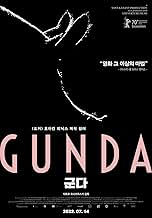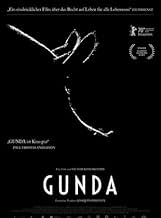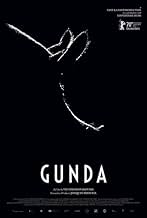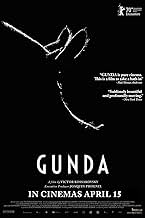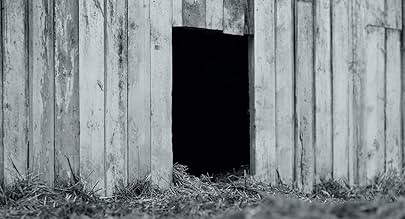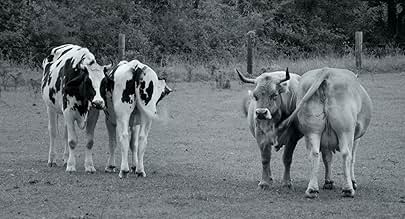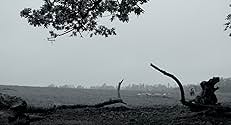VALUTAZIONE IMDb
7,1/10
3133
LA TUA VALUTAZIONE
Il documentario racconta la vita quotidiana di un maiale e dei suoi compagni animali da fattoria: due mucche e una gallina con solo una gamba.Il documentario racconta la vita quotidiana di un maiale e dei suoi compagni animali da fattoria: due mucche e una gallina con solo una gamba.Il documentario racconta la vita quotidiana di un maiale e dei suoi compagni animali da fattoria: due mucche e una gallina con solo una gamba.
- Regia
- Sceneggiatura
- Star
- Premi
- 9 vittorie e 32 candidature totali
Recensioni in evidenza
Looks like this film sometimes can't decide what it wants itself to be. Overall, it uses a highly poetic language with desaturated picture and "commercial" outlook with long dolly shots, wide angles and slow motion. At the same time, it always tends to be on animals' eyes level, depicting some of the unpleasant and cruel aspects of their life. However, it seems that camera is sometimes shy about what it sees, notably putting pig's back out of focus in final scene - which inevitably drives us to a conclusion that it's the human look on the animal, even if there's not a single human in frame. Surprisingly, the most coherent and touching part of three isolated novels is the one about chicken - particularly because of non-intrusive and highly tactile camera work.
Gunda stays somewhere between brutal realism of life and romantic pamphlet against cruelty to animals, mixing together two incompatible aesthetic approaches. However, a film like this had to be made, and I hope it will influence other filmmakers to experiment with storytelling from an animal point of view.
Gunda stays somewhere between brutal realism of life and romantic pamphlet against cruelty to animals, mixing together two incompatible aesthetic approaches. However, a film like this had to be made, and I hope it will influence other filmmakers to experiment with storytelling from an animal point of view.
"Gunda"
Experiential cinema in it's purest form, "Gunda" chronicles the unfiltered lives of a mother pig, a flock of chickens, and a herd of cows with masterful intimacy. Using stark, transcendent black and white cinematography and the farm's ambient soundtrack, the film invites the audience to slow down and experience life as his subjects do, taking in their world with a magical patience and an other worldly perspective. "Gunda" asks us to meditate on the mystery of animal consciousness, and reckon with the role humanity plays in it. In the film's opening sequence, the titular sow gives birth to a litter of squealing piglets, and over the next several segments, the film follows Gunda and her offspring as they begin to explore the world around them. Yet one is keenly aware that Gunda and her offspring are part of a man-made system of supply, and human intervention looms, unseen and mostly unheard, over the film like a specter. Gunda is the protagonist of this gentle black-and-white documentary triptych. She takes care of her little ones, accompanies them on a journey of discovery and then takes a break to recharge her batteries. She tentatively approaches the camera. Gunda is on the screen for over half of the runtime of the final film and is an extraordinarily powerful character; you do not need an interpreter to understand her emotions and experiences. Does she know what her fate is? What might she be thinking? What does she think of us? Gunda is one of several hundred million pigs that inhabit the planet, alongside a billion cattle, represented in the film by two gracefully mooing cows, and over 20 billion chickens, exemplified here by a one-legged chicken stumbling its way through the world. Whether rooting through the mud, swatting away flies or searching for worms, they all are heroes. A mother sow, two ingenious cows, and a scene-stealing, one-legged chicken, remind us of the inherent value of life for all beings. By returning a pig's gaze, listening to a cow's gentle lowing, or observing a chicken find it's wings, "Gunda" voids any pretension that we're unique in our capacity for emotion, consciousness or will. Immersed in these animal's lives, lived to the full in joy and pain, it becomes inescapable that humankind must swiftly undertake the major changes necessary to end mass exploitation of our fellow creatures. Our indignation about the ignorance of humans in general and the degradation of these creatures in particular flows into his conceptually minimalist, but visually brilliant meditation. An intervention in the form of a modest gesture. A film that ascribes majestic greatness to the underdogs. And makes us think. In the very least, the vastness of the living world, we share our planet with billions of farm animals. However, in industrialized societies we're conditioned to ignore the sentience of these animals, often regarded as a passive resource. Audiences accustomed to the cuddly, anthropomorphic barnyard animals in films like "Babe" and "Charlotte's Web" may be startled to see pigs in a fresh light. The up-close, fine-grained detail of the film's black and white images proves these creatures to be as complex and fascinating as their wild counterparts. The documentary forces us to reconsider our relationship to the humble yet majestic creatures that we think of as food. For a few hundred years, it's important to establish respect for the value of human life. It took centuries to even acknowledge that all human beings deserve the same rights. Perhaps now we can take the next step and admit that every living creature has similar rights. Pigs, butterflies, elephants , all of them have the same rights to live on this planet. We shouldn't always put ourselves in the center. We can do better than that. We're not totally awful. We did eventually come to the conclusion that slavery was unjust, we've started to respect the rights of women, of people of different genders, and to me that's a sign that we're increasing our understanding of the world. The film focuses on the conflict between human activity and it's environment. There absolutely is a common thread. Historically there's an overall acceptance by humanity that we've dominion over non-humans, that their lives are inherently less valuable than ours. History is written by the victors. We won the history of the earth for now, but who knows what happens next. The idea is very simple; we as humans are ready to change our attitudes to our fellow beings. That might be a very optimistic perspective, but at least there are some hints as to why it might be possible. Our entire treatment of animals is based on misconception. In some countries there are laws statin outright that animals don't suffer, it's written into the very fabric of the law. This is absurd. Everyone who's in regular contact with animals knows that they feel, they've emotions, they're conscious. We know this is the truth but have tacitly agreed to disregard our empirical knowledge. Instead we deny them their natural lives. If people believe that humans have souls, they should agree that animals have souls too. Documentary cinema is a great tool to show the realities of the world, to show things that we do not see by ourselves, that we do not want to see, or that we've collectively agreed that we do not see, and so we allow ourselves not to think about. "Gunda" is a mesmerizing perspective on sentience within animal species, normally, and perhaps purposely, hidden from our view. Displays of pride and reverence, amusement and bliss at a pig's inquisitive young; her panic, despair and utter defeat in the face of cruel trickery, are validations of just how similarly all species react and cope with events in our respective lives. The film crafts a visceral meditation on existence that transcends the normal barriers that separate species. It's a deeply attempt to renew our vision of life and meditate on the mystery of all animal consciousness, including our own. "Gunda" is a film without patronizing or humanizing them, without any sentimentality, and without vegan propaganda. We cannot stop people from doing what they do, but perhaps we can at least make them look more closely at what it's they're denying or destroying. Films cannot change this world, but still we feel we've to do something.
written by Gregory Mann
Experiential cinema in it's purest form, "Gunda" chronicles the unfiltered lives of a mother pig, a flock of chickens, and a herd of cows with masterful intimacy. Using stark, transcendent black and white cinematography and the farm's ambient soundtrack, the film invites the audience to slow down and experience life as his subjects do, taking in their world with a magical patience and an other worldly perspective. "Gunda" asks us to meditate on the mystery of animal consciousness, and reckon with the role humanity plays in it. In the film's opening sequence, the titular sow gives birth to a litter of squealing piglets, and over the next several segments, the film follows Gunda and her offspring as they begin to explore the world around them. Yet one is keenly aware that Gunda and her offspring are part of a man-made system of supply, and human intervention looms, unseen and mostly unheard, over the film like a specter. Gunda is the protagonist of this gentle black-and-white documentary triptych. She takes care of her little ones, accompanies them on a journey of discovery and then takes a break to recharge her batteries. She tentatively approaches the camera. Gunda is on the screen for over half of the runtime of the final film and is an extraordinarily powerful character; you do not need an interpreter to understand her emotions and experiences. Does she know what her fate is? What might she be thinking? What does she think of us? Gunda is one of several hundred million pigs that inhabit the planet, alongside a billion cattle, represented in the film by two gracefully mooing cows, and over 20 billion chickens, exemplified here by a one-legged chicken stumbling its way through the world. Whether rooting through the mud, swatting away flies or searching for worms, they all are heroes. A mother sow, two ingenious cows, and a scene-stealing, one-legged chicken, remind us of the inherent value of life for all beings. By returning a pig's gaze, listening to a cow's gentle lowing, or observing a chicken find it's wings, "Gunda" voids any pretension that we're unique in our capacity for emotion, consciousness or will. Immersed in these animal's lives, lived to the full in joy and pain, it becomes inescapable that humankind must swiftly undertake the major changes necessary to end mass exploitation of our fellow creatures. Our indignation about the ignorance of humans in general and the degradation of these creatures in particular flows into his conceptually minimalist, but visually brilliant meditation. An intervention in the form of a modest gesture. A film that ascribes majestic greatness to the underdogs. And makes us think. In the very least, the vastness of the living world, we share our planet with billions of farm animals. However, in industrialized societies we're conditioned to ignore the sentience of these animals, often regarded as a passive resource. Audiences accustomed to the cuddly, anthropomorphic barnyard animals in films like "Babe" and "Charlotte's Web" may be startled to see pigs in a fresh light. The up-close, fine-grained detail of the film's black and white images proves these creatures to be as complex and fascinating as their wild counterparts. The documentary forces us to reconsider our relationship to the humble yet majestic creatures that we think of as food. For a few hundred years, it's important to establish respect for the value of human life. It took centuries to even acknowledge that all human beings deserve the same rights. Perhaps now we can take the next step and admit that every living creature has similar rights. Pigs, butterflies, elephants , all of them have the same rights to live on this planet. We shouldn't always put ourselves in the center. We can do better than that. We're not totally awful. We did eventually come to the conclusion that slavery was unjust, we've started to respect the rights of women, of people of different genders, and to me that's a sign that we're increasing our understanding of the world. The film focuses on the conflict between human activity and it's environment. There absolutely is a common thread. Historically there's an overall acceptance by humanity that we've dominion over non-humans, that their lives are inherently less valuable than ours. History is written by the victors. We won the history of the earth for now, but who knows what happens next. The idea is very simple; we as humans are ready to change our attitudes to our fellow beings. That might be a very optimistic perspective, but at least there are some hints as to why it might be possible. Our entire treatment of animals is based on misconception. In some countries there are laws statin outright that animals don't suffer, it's written into the very fabric of the law. This is absurd. Everyone who's in regular contact with animals knows that they feel, they've emotions, they're conscious. We know this is the truth but have tacitly agreed to disregard our empirical knowledge. Instead we deny them their natural lives. If people believe that humans have souls, they should agree that animals have souls too. Documentary cinema is a great tool to show the realities of the world, to show things that we do not see by ourselves, that we do not want to see, or that we've collectively agreed that we do not see, and so we allow ourselves not to think about. "Gunda" is a mesmerizing perspective on sentience within animal species, normally, and perhaps purposely, hidden from our view. Displays of pride and reverence, amusement and bliss at a pig's inquisitive young; her panic, despair and utter defeat in the face of cruel trickery, are validations of just how similarly all species react and cope with events in our respective lives. The film crafts a visceral meditation on existence that transcends the normal barriers that separate species. It's a deeply attempt to renew our vision of life and meditate on the mystery of all animal consciousness, including our own. "Gunda" is a film without patronizing or humanizing them, without any sentimentality, and without vegan propaganda. We cannot stop people from doing what they do, but perhaps we can at least make them look more closely at what it's they're denying or destroying. Films cannot change this world, but still we feel we've to do something.
written by Gregory Mann
This is a superb piece of filmmaking that gives the viewer a real insight in to the lives of pigs and cows on higher welfare farms and of free to roam hens. No one who watches this film could doubt the sentience of its subjects or their individuality. The incredibly devoted mother pig at the centre of this film and a one legged hen are exhibits A and B in this regard. Sound is used to particularly good effect, both in the capture of the farm and country noises and in the complete absence of any commentary. The black and white footage adds to the beauty of the piece but I can't help thinking that the complete absence of colour ultimately detracts a little from an otherwise wholly authentic film. The film may not turn you into a vegetarian or a vegan but for me it surely supports an argument that particularly in the rich developed world all animals should be raised to at least "freedom food" standards and that its an indictment of modern society that some of the richest countries have the poorest animal welfare standards.
Greetings again from the darkness. We open on a pig in prone position with her head sticking through an opening in the barn. It takes a minute to realize the sow isn't sleeping, but rather giving birth. Slowly the newborn piglets begin tumbling out into the world. Cutting to a reverse camera angle, we see the 12-13 babies desperately trying to latch onto mom for their first meal. The runt of the litter struggles more than the others. Award-winning filmmaker Viktor Kosakovskiy runs this first segment just over 19 minutes. There is no dialogue. No human on screen. The soundtrack is all natural from nature: the snorts from mama sow, the squeals from piglets, and unseen birds chirping.
Our second segment finds roosters in a crate. Clearly new to the surroundings, and likely never-before "free" to roam the land, these chickens cautiously explore as the camera focuses on their tentative initial steps from the cage and startled reactions to birds. A one-legged rooster captures our attention as it makes its way through the grass and over fallen logs. It's likely the longest amount of time a movie camera has been dedicated to following roosters around.
We then head back to find the piglets have grown substantially. We don't know how much time has passed, but we watch along with their mother as the youngsters play in the field, fight with each other, and bully their youngest sibling. Gunda, the mother sow, watches over them just as any mother would watch over her kids. Our third group is introduced as the barn door opens and the cows are released. They romp into the fields like school kids at recess. Some of the cows stare directly into the camera as if to inform us they are ready for their close-up. It's fascinating to see how they use teamwork for an ingenious head-to-tail solution to the annoying flies that relentlessly pester them.
The final segment returns us to the pigs as they display the same feeding frenzy as one might witness at the buffet on a Carnival cruise. An ending that will surely evoke emotions in viewers, though maybe not at the extreme of Gunda herself. Filmmaker Kosakovskiy leaves us wondering how a black and white film with no dialogue or human characters makes such an impression as it focuses on farm animals. Pork, chicken, and beef. Clearly it's no coincidence that he chose three staples of the American diet. There is no lecture on animal rights, and none of the brutality of other "raised for food" documentaries is shown. But the message is there. It was filmed on farms in Norway, Spain, and the U. K., but the locales matter little. Director Kosakovskiy previously brought us the excellent AQUARELA (2018), a documentary showcasing the nature of water and ice, and here he assisted Egil Haskjold Larsen with cinematography, and Ainara Vera with editing. It's an unusual film, and one meant to inspire reflection and thought ... and hopefully change.
In theaters beginning April 16, 2021.
Our second segment finds roosters in a crate. Clearly new to the surroundings, and likely never-before "free" to roam the land, these chickens cautiously explore as the camera focuses on their tentative initial steps from the cage and startled reactions to birds. A one-legged rooster captures our attention as it makes its way through the grass and over fallen logs. It's likely the longest amount of time a movie camera has been dedicated to following roosters around.
We then head back to find the piglets have grown substantially. We don't know how much time has passed, but we watch along with their mother as the youngsters play in the field, fight with each other, and bully their youngest sibling. Gunda, the mother sow, watches over them just as any mother would watch over her kids. Our third group is introduced as the barn door opens and the cows are released. They romp into the fields like school kids at recess. Some of the cows stare directly into the camera as if to inform us they are ready for their close-up. It's fascinating to see how they use teamwork for an ingenious head-to-tail solution to the annoying flies that relentlessly pester them.
The final segment returns us to the pigs as they display the same feeding frenzy as one might witness at the buffet on a Carnival cruise. An ending that will surely evoke emotions in viewers, though maybe not at the extreme of Gunda herself. Filmmaker Kosakovskiy leaves us wondering how a black and white film with no dialogue or human characters makes such an impression as it focuses on farm animals. Pork, chicken, and beef. Clearly it's no coincidence that he chose three staples of the American diet. There is no lecture on animal rights, and none of the brutality of other "raised for food" documentaries is shown. But the message is there. It was filmed on farms in Norway, Spain, and the U. K., but the locales matter little. Director Kosakovskiy previously brought us the excellent AQUARELA (2018), a documentary showcasing the nature of water and ice, and here he assisted Egil Haskjold Larsen with cinematography, and Ainara Vera with editing. It's an unusual film, and one meant to inspire reflection and thought ... and hopefully change.
In theaters beginning April 16, 2021.
IN BRIEF: A well-made but slow moving pig's tale.
JIM'S REVIEW: (RECOMMENDED) A pig and her litter, a one-legged chicken, and some cows are the main cast in this fine documentary, Gunda, Viktor Kosakovskiy's understated cinematic plea for animal rights.
Gunda is an enormous sow that has just given birth to a dozen small piglets. This is their story of life down on the farm. Call me a city boy, but the film depicts the daily mundane weeks in this pig's heaven (or hell) and I have chosen the right lifestyle for me. Still, it is a fascinating place to visit.
There are no voiceovers, no sweeping musical score, no Disney sentimentalizing... just straight-forward filming of natural country events. There are many grunts, squeals, and moos to be heard and lots of mud and flies buzzing around too.
This is a well-made documentary that tries to convey an animal's everyday existence. The wonderful sound design by Alexander Dudarev immerses the moviegoer into this rarely-seen animal kingdom. The masterful b&w photography by Egil Håskjold Larsen and the director is stunning with its low-level point of view and detailed close-ups of farm critters.
However, the story seems non-existent and Mr. Kosakovskiy lets scenes go on for far too long, at a turtle's pace, although none of those creatures are in sight. The documentary does eventually build to its subtle message about the cruelty of our food chain, but any astute moviegoer knows the fate of our little dirty dozen from the start. (A side note: All of our violent deeds are strongly implied, but mercifully not shown.) I could say there is much food for thought in this documentary, but then I would be called insensitive or callous. Let's just say, this film deserves your attention. (GRADE: B-)
JIM'S REVIEW: (RECOMMENDED) A pig and her litter, a one-legged chicken, and some cows are the main cast in this fine documentary, Gunda, Viktor Kosakovskiy's understated cinematic plea for animal rights.
Gunda is an enormous sow that has just given birth to a dozen small piglets. This is their story of life down on the farm. Call me a city boy, but the film depicts the daily mundane weeks in this pig's heaven (or hell) and I have chosen the right lifestyle for me. Still, it is a fascinating place to visit.
There are no voiceovers, no sweeping musical score, no Disney sentimentalizing... just straight-forward filming of natural country events. There are many grunts, squeals, and moos to be heard and lots of mud and flies buzzing around too.
This is a well-made documentary that tries to convey an animal's everyday existence. The wonderful sound design by Alexander Dudarev immerses the moviegoer into this rarely-seen animal kingdom. The masterful b&w photography by Egil Håskjold Larsen and the director is stunning with its low-level point of view and detailed close-ups of farm critters.
However, the story seems non-existent and Mr. Kosakovskiy lets scenes go on for far too long, at a turtle's pace, although none of those creatures are in sight. The documentary does eventually build to its subtle message about the cruelty of our food chain, but any astute moviegoer knows the fate of our little dirty dozen from the start. (A side note: All of our violent deeds are strongly implied, but mercifully not shown.) I could say there is much food for thought in this documentary, but then I would be called insensitive or callous. Let's just say, this film deserves your attention. (GRADE: B-)
Lo sapevi?
- QuizJoaquin Phoenix and Paul Thomas Anderson were amongst the first people in the industry to publicly praise the film.
- BlooperGunda is shown wallowing in mud and the mud covers her teats. In the next sequence, her piglets suckle her teats which are suddenly clean.
I più visti
Accedi per valutare e creare un elenco di titoli salvati per ottenere consigli personalizzati
Dettagli
- Data di uscita
- Paesi di origine
- Siti ufficiali
- Lingua
- Celebre anche come
- Gunda: Mother, Pig
- Luoghi delle riprese
- Grøstad farm, Undrumsdal in Tønsberg municipality, Norvegia(the pig farm location)
- Aziende produttrici
- Vedi altri crediti dell’azienda su IMDbPro
Botteghino
- Lordo Stati Uniti e Canada
- 115.691 USD
- Fine settimana di apertura Stati Uniti e Canada
- 5023 USD
- 18 apr 2021
- Lordo in tutto il mondo
- 383.128 USD
- Tempo di esecuzione1 ora 33 minuti
- Colore
- Proporzioni
- 1.85 : 1
Contribuisci a questa pagina
Suggerisci una modifica o aggiungi i contenuti mancanti



